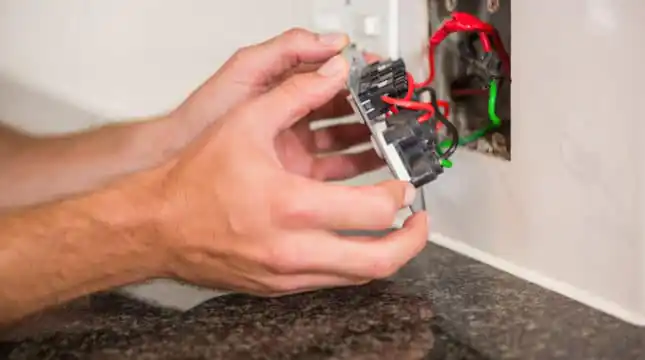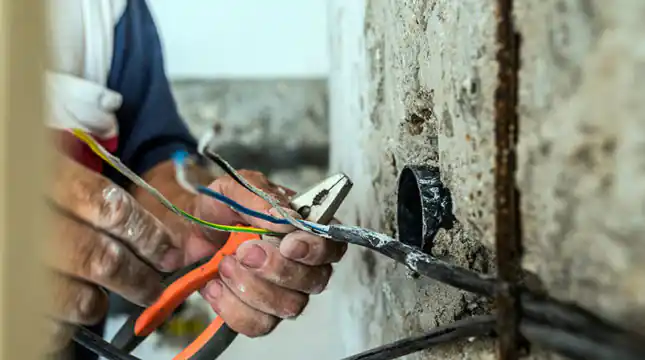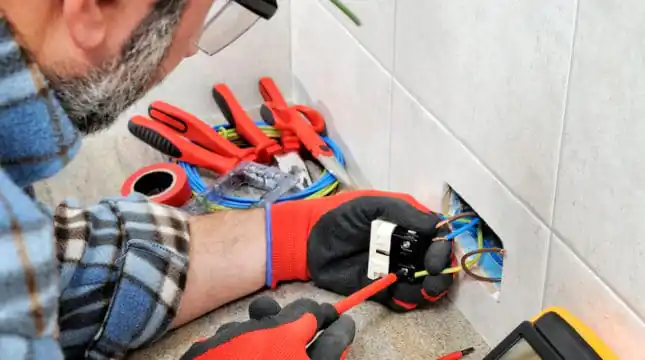Minnesota
License required: Yes
Licensing authority: Minnesota Department of Labor and Industry (DLI)
In Minnesota, contractor-level businesses generally operate through a Class A master electrician who is designated as the responsible person for permits and supervision.
To qualify as a Class A master electrician, applicants must document 60 months of varied electrical experience and pass the state exam. That credential is then used to support an electrical contractor business license or registration as required by DLI and local jurisdictions.
Required business insurance in Minnesota:
Mississippi
License required: Yes, for residential electrical work over $10,000 and commercial electrical work over $50,000
Licensing authority: Mississippi State Board of Contractors (MSBOC)
Mississippi does not issue statewide electrician or journeyman electrician licenses, but electrical contractors performing projects above the state’s dollar thresholds must hold a state contractor license with the appropriate electrical classification. This license allows contractors to bid on qualifying residential or commercial electrical work, pull permits and operate legally within the state.
To qualify, applicants must pass the trade exam and the business and law exam, submit financial documentation and meet MSBOC’s application requirements.
Note on recent updates: Starting in 2026, the Mississippi State Board of Contractors will send all license renewal notices by email only, so electrical contractors must keep an up-to-date email address on file.
Required business insurance in Mississippi:
Missouri
License required: At the local level only
Licensing authority: Local cities, counties and building departments
Missouri does not issue a statewide electrician license, so electrical contractors must follow the licensing or registration rules set by the city or county where they plan to work. Requirements can vary widely and may include exams, proof of experience, bonding or liability insurance for permits and contract approval.
Required business insurance in Missouri:
- Workers’ compensation insurance is required for businesses with five or more employees, or for all construction businesses regardless of size.
- General liability insurance is not required statewide, but many municipalities require it for contractor registration and most project owners expect coverage.
Montana
License required: Yes
Licensing authority: Montana Department of Labor and Industry — State Electrical Board
Montana requires electrical contractors to obtain either a limited or unlimited electrical contractor license, which allows them to bid on projects, pull permits and employ licensed electricians.
To qualify, applicants must hold or employ a journeyman electrician (for a limited license) or a master electrician (for an unlimited license) and show proof of compliance with Montana’s workers’ compensation and unemployment insurance requirements.
Required business insurance in Montana:
Nebraska
License required: Yes
Licensing authority: Nebraska Electrical Division
Nebraska requires electrical contractors to hold a contractor license issued by the Nebraska Electrical Division, which authorizes them to operate an electrical business, pull permits and supervise licensed electricians.
To qualify, applicants must either complete an accredited four-year electrical program and have one year of journeyman experience, or document five years of experience in planning, laying out, supervising and installing electrical wiring and equipment, and pass the state exam.
Required business insurance in Nebraska:
Learn more about electrician license and insurance requirements in Nebraska.
Nevada
License required: Yes
Licensing authority: Nevada State Contractors Board (NSCB)
Nevada requires electrical contractors to hold a C-2 Electrical Contracting license to perform residential, commercial or industrial electrical work. This license authorizes permit-level work, project bidding and supervision of electrical installations statewide.
To qualify for a C-2 license, applicants must document four years of journeyman- or master-level experience within the past 15 years, pass both the trade exam and the business and law exam and meet Nevada’s financial responsibility and bonding requirements.
Required business insurance in Nevada:
New Hampshire
License required: Yes
Licensing authority: New Hampshire Office of Professional Licensure and Certification (OPLC), Electricians’ Board
New Hampshire requires master electricians to be licensed at the state level in order to contract for electrical work, pull permits and supervise journeymen and apprentices.
To qualify for a master electrician license, applicants must first pass the journeyman exam, document 2,000 hours of journeyman experience and pass the master exam.
Required business insurance in New Hampshire:
New Jersey
License required: Yes
Licensing authority: New Jersey Department of Law and Public Safety, Division of Consumer Affairs — Board of Examiners of Electrical Contractors
New Jersey requires electricians to hold a state electrical contractor license to perform residential, commercial or industrial electrical work. Licensed electrical contractors may operate an electrical business, pull permits and supervise journeymen and apprentices statewide.
To qualify, applicants must be at least 21 years old, hold a high school diploma and pass the state licensing exam. They must also document five years of practical experience or follow an approved pathway such as completing a four-year apprenticeship, holding a journeyman license with one year of experience or earning an electrical engineering degree plus two years of experience.
Required business insurance in New Jersey:
New Mexico
License required: Yes
Licensing authority: New Mexico Regulation and Licensing Department
New Mexico requires electrical contractors to obtain a contractor license to bid on projects, pull permits and operate an electrical business, and all electrical work must be performed under the appropriate journeyman classification.
To become an electrical contractor, applicants must hold a journeyman license in the relevant classification, show proof of financial responsibility, hold a current New Mexico tax ID number and pass both the business and law exam and the applicable electrical trade exam for their license classification.
Required business insurance in New Mexico:
New York
License required: At the local level only
Licensing authority: Local cities, counties and building departments
New York does not issue a statewide electrician or electrical contractor license. Licensing and permitting requirements are set by individual cities and counties, which often have strict standards for contractor registration, exams, insurance and on-the-job experience.
Required business insurance in New York:
North Carolina
License required: Yes for electrical contractors; journeyman-level licensing is local
Licensing authority: North Carolina State Board of Examiners of Electrical Contractors (for contractors); local jurisdictions (for journeyman-level licensing)
North Carolina regulates electrical contractors at the state level, while journeyman or technician licensing is handled by local jurisdictions. State-issued electrical contractor licenses allow you to bid on projects, pull permits and supervise electrical work in residential, commercial and industrial settings. Contractors must apply for the correct classification based on the scope and voltage of work they plan to perform.
To qualify, applicants must meet the experience requirements for their classification — four years for Limited and six years for Intermediate. Unlimited classification requires at least five years of experience and two reference statements from licensees of equal or higher classification.
Required business insurance in North Carolina:
North Dakota
License required: Yes
Licensing authority: North Dakota State Electrical Board
North Dakota requires electrical work to be supervised by a licensed contracting master electrician, who is the only license type authorized to operate an electrical business, pull permits and oversee installations.
To qualify as a master electrician, applicants must document 2,000 hours of journeyman-level experience under the supervision of a contracting master electrician and pass the state exam.
Required business insurance in North Dakota:
- Workers’ compensation insurance is required for businesses with one or more employees. Because North Dakota is a monopolistic state, coverage must be purchased through Workforce Safety & Insurance (WSI), the state-run workers’ comp fund.
- General liability insurance is not mandated statewide for electrical contractors, but many municipalities require it for permits and most commercial clients expect coverage.









